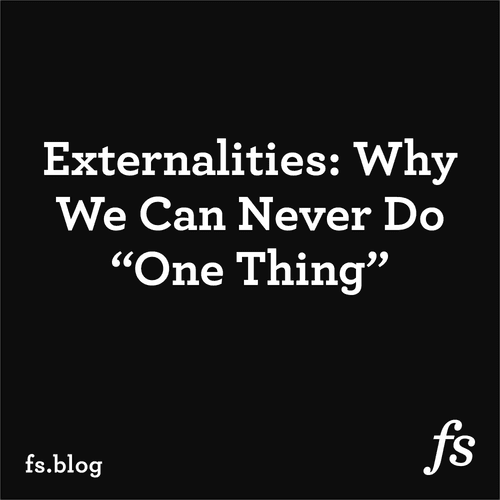Learn more about personaldevelopment with this collection
The impact of opportunity cost on personal and professional life
Evaluating the benefits and drawbacks of different choices
Understanding the concept of opportunity cost
Externalities
An externality affects someone without them agreeing to it. It can be positive or negative. Most externalities are small but can make a significant impact over time. Understanding the types of externalities and the consequences they have can help us improve our decision making.
One family member leaves their dirty dishes in the sink. They get the benefit of using the plate. Someone else bears the cost of washing it later.
120
371 reads
The First Law of Ecology
We can never do one thing. We should consider what the second-order consequences will be. When we interact with a system, we need to find out what the broader repercussions of our actions will be.
111
379 reads
Negative Externalities
They can occur during the production or consumption of a service or goods. Calling something a negative externality can be a way of avoiding responsibility.
If a factory pollutes nearby water supplies, it causes harm without added costs to the factory. The costs to society are high and are not reflected in the price of whatever the factory produces. Even if pollution is taxed, the harmful effects still remain.
79
268 reads
Positive Externalities
A positive externality imposes an unexpected benefit on a third party. The producer doesn't agree to this, nor do they receive a 'reward' for it.
- Scientific research can have applications beyond their initial scope.
- Blaise Pascal and Pierre de Fermat developed probability theory to solve a gambling dispute. Probabilities are now a core part of how we think.
79
305 reads
Positive Externalities Issues
- Someone who comes up with a solution cannot expect compensation each time the solution gets used. It results in reduced incentives to invest time and effort to discover new solutions. Algorithms, patents, and copyright laws try to solve this dilemma by allowing creators to profit from their ideas for years.
- The "free-rider" problem: When we enjoy something that we aren't paying for, we tend not to value it. A large portion of online content succumbs to the free-rider problem.
82
230 reads
Positional Externalities
They are a form of second-order effects. They arise when our decisions change the context of future perception or value.
A person decides to stay an hour after work, but the person still completes the usual amount of work. Co-workers might also stay an hour later. Now the same job takes an hour longer to complete, and anyone who leaves the standard time is perceived as lazy. It is a lose-lose situation.
74
176 reads
Luxury Goods
Status symbols like diamonds, Lamborghinis, tailor-made suits lose their value if they become cheaper or if too many people own them. They derive their value only in comparison to the average of the group to whom the consumer compares.
The same is true when we change our attitudes.
70
202 reads
Consider your Externalities
Externalities are everywhere. It's easy to disregard the impact of our decisions - to stay late at the office or to drop litter. We run the risk of paying a price if we do not mind our actions.
Keep in mind to always ask: and then what?
77
199 reads
CURATED BY
More like this
3 ideas
Do we actually grow from adversity?
bigthink.com
3 ideas
Things we forget as we grow up- Alcohol habits
phanestories.wordpress.com
3 ideas
4 Types of Difficult People and How to Deal With Them | Science of People
scienceofpeople.com
Read & Learn
20x Faster
without
deepstash
with
deepstash
with
deepstash
Access to 200,000+ ideas
—
Access to the mobile app
—
Unlimited idea saving & library
—
—
Unlimited history
—
—
Unlimited listening to ideas
—
—
Downloading & offline access
—
—
Personalized recommendations
—
—
Supercharge your mind with one idea per day
Enter your email and spend 1 minute every day to learn something new.
I agree to receive email updates
